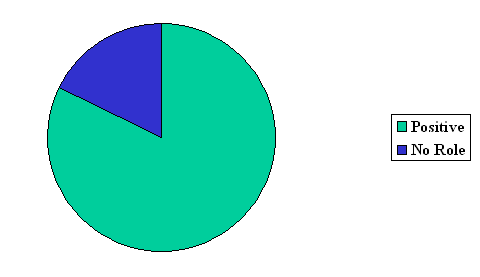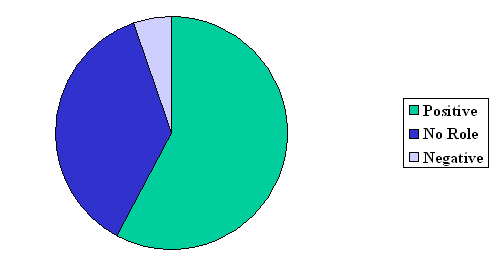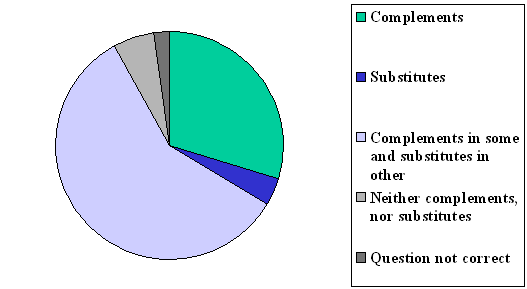Relations between Research and Teaching in Economics (from the results of 2003 - 2005 lecturers surveys)
In the 2003 survey we asked lecturers about their attitudes towards teaching and research and their perceptions of how their departments rank them. The majority of respondents (54%) believed that their departments considered teaching considerably or somewhat less important then research, while among the respondents themselves this view was shared by less then one third (27%). Equal value was attached to teaching and research by slightly more than two out of five of the respondents; while only one in five thought that that was the way their departments saw it.
In 2005 we wanted to explore further the question of how lecturers perceive the relationship between teaching and research. We asked whether they see teaching and research as complements or as substitutes and what are the implications of their answer.
The relationship between teaching and research has been the subject of many papers published in UK, USA and Australia. The conclusions from those papers, however, are contradictory and will be further discussed in a separate publication.
Respondents from our survey, when asked about the area of their research, gave very diverse answers, including, but not limited to Applied Econometrics, Applied Macro and Microeconomics, Development Economics, Economics History, Finance, Industrial Economics, International Economics, Labour Economics, Regional Economics and Political Economy. Some of the lecturers mention economics education, while a few notes that right now they are not interested in research. Among those who answered our survey, less then one in five (18%) believe that research plays no role in teaching, while the majority (82%) think that it plays a positive role. No one suggested that it plays a negative role.
Figure 1. Attitudes of respondents on the role research plays in their teaching

Those who replied that research plays no role in their teaching either did not leave any comment or gave one of the following comments: "teaching not related to my research" or "mutually exclusive". Only one of the respondents mentioned that students' lack of interest in the course makes it impossible to convey the interest of research.
Among those who find a positive role for their research in teaching, some respondents provide specific examples of this role, while others give general comments about their mutual influence. "Teaching and research are intertwined because one gives you ideas to employ in the other!" The following are some typical examples:
- Empirical findings from the research complements theoretical understanding of the topics covered in teaching
- Provides examples and illustrations
- Sets the agenda
- Informs curriculum
- Provides issues for class discussion
- Raises competence and confidence
- Strong link between research and dissertation supervision
- Helps ensure the currency of materials in the reading lists
- Active research
- The nature of research makes me more aware of issues to do with effective teaching and learning
- Builds up knowledge both of technique and applications
- Ability to give students some idea of what's going on at the frontier
- Research gives me new ideas about new ways of teaching standard results
- Validation of lecturer as economics professional/practitioner outside the classroom
- Focus on aspects that my research can highlight
- Gives me data sets
The attitudes of the respondents were less positive when we asked them what role teaching plays in their research. This time 5% pointed to the negative role of teaching, 37% presume that it doesn't play any role, but the majority of 58% still agreed that the role of teaching in research is positive.
Figure 2 Attitudes of respondents on the role teaching play in their research

Those who describe the role as negative either left no comments, or pointed to the fact that teaching takes time from research and that they are mutually exclusive. Those who deny that it plays any role also left few comments, just pointing to the fact, that "occasionally get an idea from teaching, but it is rare". The majority, who see the role of teaching as positive, provided specific examples. The following are representative:
- Use my students as examples
- Students questions make me think about potential research questions
- Some of my work on pedagogic issues is carried out within my teaching activity
- Teaching a topic makes you work hard about making it understandable
- Helps sharpen/focus some arguments
- Students views provide fresh ways of looking at issues
- Application of rigorous, defendable tools of economic analysis to areas of applied research
- Use teaching experiences in theory and vice versa
- Influences my choice of research topics
- Testing ideas by having to explain them in simple language
- Teaching tests clarity of understanding and grasp of issues and drives scholarly enquiry
- Need to teach beyond research areas keeps me up with broader aspects of the subject which benefit my research
- Some research ideas develop from teaching problems
- Helps me identify gaps in literature
- Motivated a new line in educational research
- Feed back on what is happening in local areas
- Use classroom experiments for research
- Expanding knowledge of field
- Action research
- Better understanding of students learning needs
- Try to structure papers as if I am teaching them
We also asked the respondents about their perception of teaching and research in economic terms; whether they were complements or substitutes and what were the implications of their answer.
Figure 3 Respondents' perceptions of teaching and research in terms of complements and substitutes

About 2% of the lecturers thought the question was not correct and asked for it to be re-constructed. As for the rest, a majority of 58% agreed that teaching and research are complements in some respects and substitutes in others. Less then a third (30%) thought that they are complements and not substitutes, while 4% agreed with the opposite statement, that they are substitutes and not complements. The last small group of 6% said that research and teaching are neither complements nor substitutes.
The respondents suggested the following implications for their answers:
I. Complements in some respects and substitutes in others
- Research informs my teaching but teaching and research compete for the time I have
- Teaching and research should be complementary but teaching is seen as a "second rate" activity compared to research
- Teaching should be efficiently organised to minimise preparation and assessment demands
- Each activity can yield multiple benefits but time spent on predominantly on activity or another incurs an opportunity cost in terms of the other one
- That work loads should make room for both; and that allocation of teaching amongst staff should take appropriate account of research interests and activities
- Need for more balance in rewards and incentives
- I feel happier teaching in areas where I do research, while developing new teaching material can generate new research ideas
II. Complements and not substitutes
- There are diminishing returns to teaching which may turn negative
- More effort should be made to integrate the two
- More 'respect' should be given to teaching
- You need time afforded for both and equal emphasis on both
- May be there is scope for individuals specialising in research or teaching
- If researcher is a good teacher, then research is beneficial and has a positive aspect on teaching; but if researcher is not good at teaching then students receive few benefits from research of teacher
- Advanced teaching is research informed and teaching stimulates research questions
- Teaching and research are complements, but they are not viewed as complements under the modern quality assurance approach. The teaching quality bureaucracy has become a hindrance in combining teaching with research. The implication is to revisit QA
- Advancing research keeps teaching current
- Departments need to exploit synergy between research and teaching
- Current RAE funding strategies are quite irrelevant and tend to categorise individuals in a way that diminishes the richness of what is going on at university
- That a blend of research and teaching produces benefits all-round
- Research and teaching are two wheels of a carriage
- Research in its widest sense supports teaching, but is not a substitute for it. Being a researcher is no excuse not to teach
III. Substitutes and not complements
- Only a fool puts any effort into teaching. The university takes the view that teaching is a "bad", research is a "good"…certainly true for academic promotions both within and between institutions
- That one should teach as little as possible
- We should be paid and rewarded separately for each
IV. Neither complements nor substitutes
- I am not using my research in my teaching since I am teaching different stuff from my research
- There should be career routes in both areas, not just in research
- Depending on the specific nature of teaching and research, they may be complements, substitutes or independent
The issue of the relationship between teaching and research is one of growing interest and concern in UK higher education and the Economics Network can use the results of this survey to further inform the discussions in this area on a national level and to help support the enhancement of the relationship.
Where there is perceived to be a conflict between teaching and research, HE institutions need to consider how their research can best enhance their teaching, rather than distracting academics from improving their teaching because the necessary time to do so impinges upon their research time.
